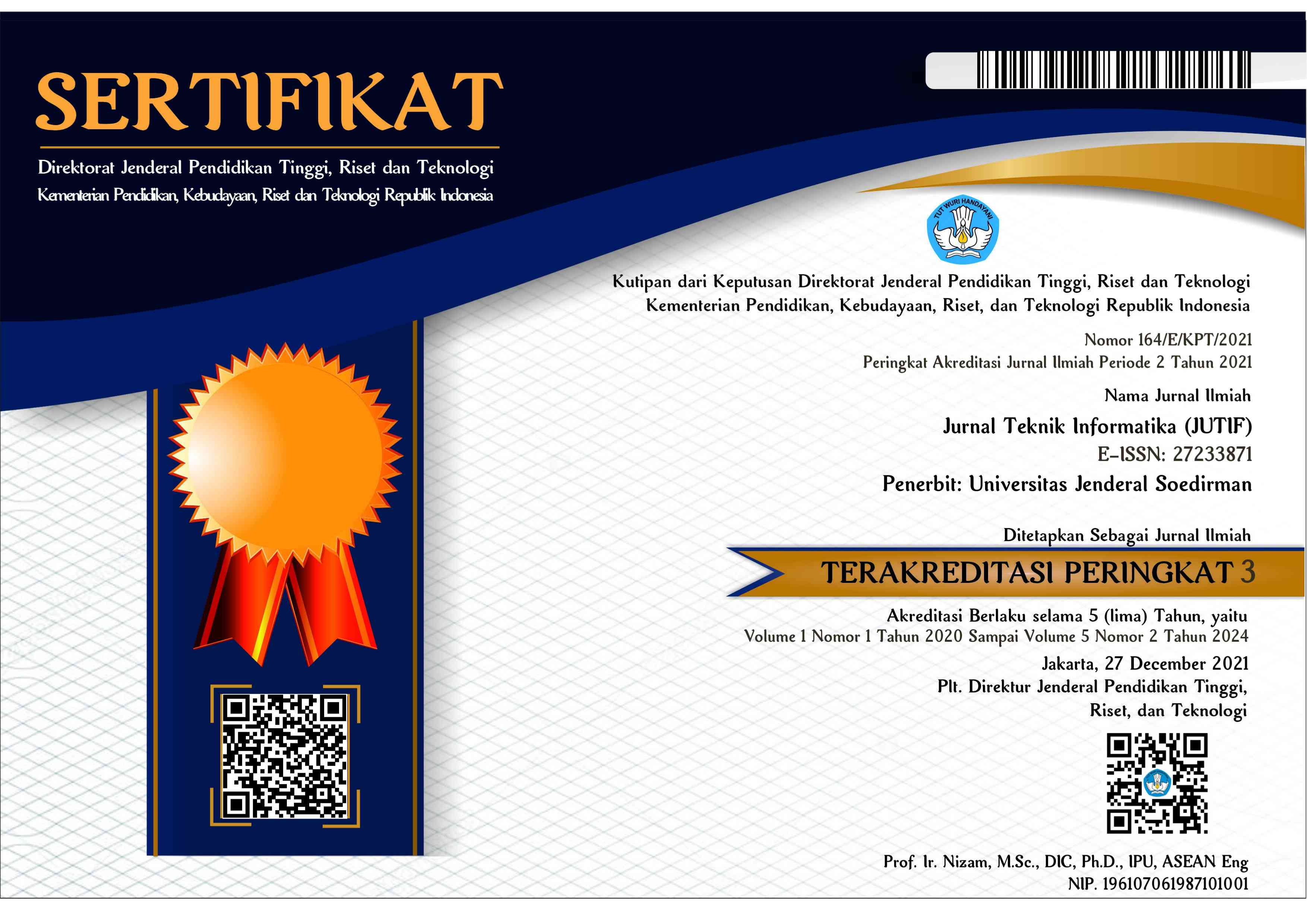THE EFFECT OF UNIGRAM AND BIGRAM IN THE NAÏVE BAYES MULTINOMIAL FOR ANALYZING OF COMMENT SENTIMENT OF GOJEK APPLICATION IN GOOGLE PLAY STORE
Abstract
In sentiment classification systems that use Naïve Bayes Classifier, a commonly used feature extraction method is TF-IDF with unigram and bigram, where the two is used separately. In the reality, most of texts contain single or composed word,so it is needed to use the combination of unigram and bigram to maximize the accuracy of the classification results. In this research, the impact and performance improvement between classification systems using unigram or bigram solely and those using a combination of both are studied. Using 1000 data of reviews with ratings 1 (negative) and 5 (positive) from Gojek users on the Google Play Store, and performing performance validation with K-Fold at K=10, the system that uses the combined TF-IDF feature extraction of unigrams and bigrams achieves the best performance among the three systems with an accuracy of 0.84, however the accuracy of the system that uses unigrams solely has accuracy of 0.83, and 0.7 for the system that uses bigram. From the results of the research, it can be concluded that the use of the combination of unigram and bigram can increase the accuracy of the classification result.
Downloads
References
R. Wahyudi dan G. Kusumawardhana, “Analisis Sentimen pada Review Aplikasi Grab di Google Play Store Menggunakan Support Vector Machine,” Jurnal Informatika., vol. 8, no. 2, pp. 200–207, 2021, doi: 10.31294/ji.v8i2.9681.
N. Fitriyah, B. Warsito, dan D. A. I. Maruddani, “Analisis Sentimen Gojek pada Media Sosial Twitter dengan Klasifikasi Support Vector Machine (SVM),” Jurnal Gaussian, vol. 9, no. 3, pp. 376-390, 2020, doi:10.14710/j.gauss.9.3.376-390.
“Gojek - Aplikasi di Google Play,” 2023. https://play.google.com/store/apps/details?id=com.gojek.app&hl=id&gl=US (accessed January 19, 2023).
S. M. Salsabila, A. Alim Murtopo, dan N. Fadhilah, “Analisis Sentimen Pelanggan Tokopedia Menggunakan Metode Naïve Bayes Classifier,” Jurnal Minfo Polgan, vol. 11, no. 2, pp. 30–35, 2022, doi: 10.33395/jmp.v11i2.11640.
A. Rahman, E. Utami, dan S. Sudarmawan, “Sentimen Analisis Terhadap Aplikasi pada Google Playstore Menggunakan Algoritma Naïve Bayes dan Algoritma Genetika,” Jurnal Komtika Komputasi Dan Inform., vol. 5, no. 1, pp. 60–71, 2021, doi: 10.31603/komtika.v5i1.5188.
“Sentimen Naive Bayes - Google Scholar,” 2022. https://scholar.google.com/scholar?hl=en&as_sdt=0%2C5&q=sentimen+naive+bayes&btnG= (accessed June 3, 2022).
A. I. Tanggraeni dan M. N. N. Sitokdana, “Analisis Sentimen Aplikasi E-Government pada Google Play Menggunakan Algoritma Naïve Bayes,” JATISI Jurnal Teknik Informatika Dan Sistem Informasi, vol. 9, no. 2, pp. 785–795, 2022, doi: 10.35957/jatisi.v9i2.1835.
T. Yusnitasari, D. Ikasari, E. E. S. Pratiwi, dan N. Syahri, “Analisis Sentimen Terhadap Review Restoran Fish Streat pada Aplikasi Zomato Menggunakan Stemming Nazief Adriani dan Naive Bayes Classifier,” Prosiding Sentrinov, 2017, vol. 3, pp. 12, url: http://proceeding.sentrinov.org/index.php/sentrinov/article/view/181/160.
Raksaka Indra Alhaqq, I Made Kurniawan Putra, dan Yova Ruldeviyani, “Analisis Sentimen terhadap Penggunaan Aplikasi MySAPK BKN di Google Play Store,” Jurnal Nasional Teknik Elektro Dan Teknologi Informasi, vol. 11, no. 2, pp. 105–113, 2022, doi: 10.22146/jnteti.v11i2.3528.
A. Kusuma dan H. N. Irmanda, “Analisis Sentimen Pada Ulasan Aplikasi Indodax di Google Play Store Menggunakan Metode Support Vector Machine,” Seminar Nasional Mahasiswa Ilmu Komputer dan Aplikasinya (Senamika), 2022, pp. 563–574, url: https://conference.upnvj.ac.id/index.php/senamika/article/view/2214/1761.
F. V. Sari dan A. Wibowo, “Analisis Sentimen Pelanggan Toko Online JD.ID Menggunakan Metode Naive Bayes Classifier Berbasis Konversi Ikon Emosi,” Jurnal SIMETRIS, vol. 10, no. 2, pp. 681-686, 2019, url: https://jurnal.umk.ac.id/index.php/simet/article/view/3487/1883.
A. H. Al-Atho’Illah, E. D. Wahyuni, dan A. A. Arifiyanti, “Model Klasifikasi Teks Produk Terlarang Menggunakan Algoritma Campuran (Hybrid) SVM dan Leksikon,” Jurnal Informatika dan Sistem Informasi, vol. 1, no. 2, pp. 10, 2020, url: https://garuda.kemdikbud.go.id/documents/detail/1757899.
D. N. N. Husnina, D. E. Ratnawati, dan B. Rahayudi, “Analisis Sentimen Pengguna Aplikasi RedBus berdasarkan Ulasan di Google Play Store menggunakan Metode Naïve Bayes,” Jurnal Pengembangan Teknologi Informasi dan Ilmu Komputer, vol. 7, no. 2, pp. 737–743, 2023, url: https://j-ptiik.ub.ac.id/index.php/j-ptiik/article/view/12297/5593.
Y. Asri, W. N. Suliyanti, D. Kuswardani, dan M. Fajri, “Pelabelan Otomatis Lexicon Vader dan Klasifikasi Naive Bayes dalam menganalisis sentimen data ulasan PLN Mobile: Analisis Sentimen,” PETIR, vol. 15, no. 2, pp. 264–275, 2022, doi: 10.33322/petir.v15i2.1733.
N. Salmi and Z. Rustam, “Naïve Bayes Classifier Models for Predicting the Colon Cancer,” IOP Conf. Series: Materials Science and Engineering 546 (2019) 052068, pp. 1–8, 2019, doi:10.1088/1757-899X/546/5/052068.
Copyright (c) 2023 Adrian Dwinanda Adyatma, Lasmedi Afuan, Eddy Maryanto

This work is licensed under a Creative Commons Attribution 4.0 International License.




























